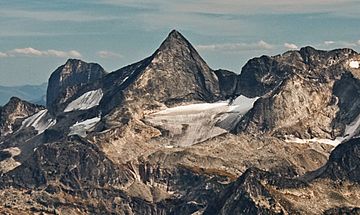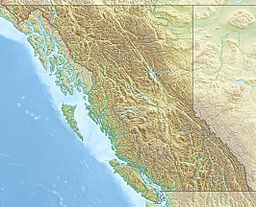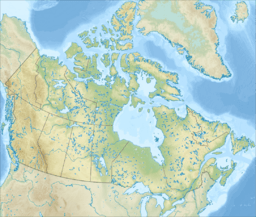Asgard Peak facts for kids
Quick facts for kids Asgard Peak |
|
|---|---|

Asgard Peak, north side with small glacier
|
|
| Highest point | |
| Elevation | 2,825 m (9,268 ft) |
| Prominence | 275 m (902 ft) |
| Parent peak | Gladsheim Peak (2830 m) |
| Listing | Mountains of British Columbia |
| Geography | |
| Location | Valhalla Provincial Park British Columbia, Canada |
| Parent range | Valhalla Ranges Selkirk Mountains |
| Topo map | NTS 82F13 |
| Type of rock | Granitic |
| Climbing | |
| Easiest route | East Ridge class 3 |
Asgard Peak is a mountain summit in British Columbia, Canada. It stands tall at 2,825-metre (9,268-foot). This peak is part of the Valhalla Ranges, which are found within the larger Selkirk Mountains.
Asgard Peak is the second-highest point in the Valhalla Ranges. The highest peak, Gladsheim Peak, is just 2.1 km (1.3 mi) to the east. You can find Asgard Peak in the southern part of Valhalla Provincial Park. It's about 6 km (3.7 mi) south of a place called Devils Couch. It's also about 13 km (8.1 mi) west of the town of Slocan and Slocan Lake.
The name "Valhalla Mountains" first appeared on a map in 1890. This map was made by George Mercer Dawson for the Geological Survey of Canada. Dawson gave names from Norse mythology to many mountains and ranges in the Southern Kootenay area. Following this theme, the name "Asgard Peak" was suggested in February 1970. It was proposed by Robert Dean from the Kootenay Mountaineering Club. The name was officially accepted on March 3, 1971, by the Geographical Names Board of Canada. In Norse mythology, Asgard is a special place where the twelve gods live.
Asgard Peak has a subarctic climate. This means it has very cold, snowy winters. The summers are usually mild. Because of this cold climate, a small glacier can be found on the peak's north side. Winter temperatures can drop below −20 °C. With the wind chill, it can feel even colder, sometimes below −30 °C. The water from the mountain flows into streams that eventually join the Slocan River.
Climbing Routes
Many paths have been found to climb Asgard Peak. Here are some of the established routes:
- East Ridge
- West Ridge
- Southwest Ridge - This route was first climbed in 1927.
- Southeast Ridge
- North Ridge
- South Face Left
- South Face Center
- South Face Right
 | James Van Der Zee |
 | Alma Thomas |
 | Ellis Wilson |
 | Margaret Taylor-Burroughs |



